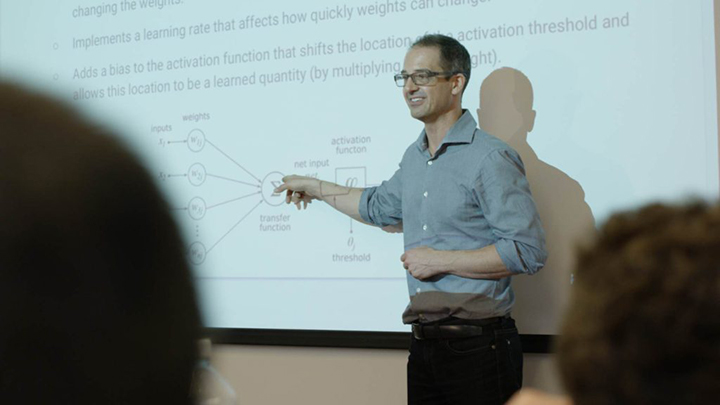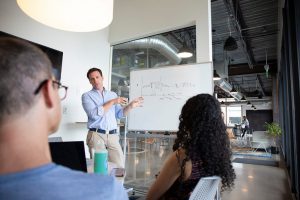Galvanize: How to become a data scientist

College is expensive, takes at least six years to earn a master’s degree, and leaves graduates with plenty of theoretical knowledge, but little hands-on training. Top-rated data science bootcamps are intense, immersive, and aim to get graduates the data science skills they need to get a job faster.
Learning communities like Galvanize offer a three-month-long immersive data science bootcamp that brings together instruction into machine learning, statistical analysis, natural language processing, and data visualization.
Frank Burkholder, Lead Instructor and Principal Data Scientist for Galvanize Denver, says that people who want to go out and get a job in data science need to be statistically trained, understand linear algebra and calculus, and have some programming skills. Employers are clamoring for more skilled workers who can jump into a job with both feet and hit the ground running. Degree programs are more theoretical; more academic, he says.
That’s why “Galvanize and other coding bootcamps have done so well.”
There is a difference between having specific knowledge in all of the areas necessary to get a job in data science and knowing how to apply that knowledge, he adds.
Dr. Jarred Bultema, who graduated from Galvanize’s data science bootcamp in the first week of August, already had a Ph.D. in biochemistry and was a professor of biochemistry at the University of Colorado Colorado Springs campus before enrolling at Galvanize.
“I was looking for a career transition and thought I would try it,” he says. “The appeal of the bootcamp program is the rapid process to reskill and people do get jobs out of it.”

The program was more intense than he imagined but “three months is doable.” Any longer and he says he isn’t sure he could have completed the program.
It is a full-time endeavor for those three months and much preparation is necessary before even applying to the program. That said, he has already had three job interviews in data science and is awaiting an offer from his top company out of the three. Because of his prior educational experience, he believes he is getting offered director-level positions.
He admits there is “no way” he would have been considered for these more advanced jobs without his prior research experience and background in teaching. He also wouldn’t have qualified for the jobs without the in-depth data science project experience he gained through the Galvanize Data Science bootcamp.
Bultema says that many of the students in his cohort did not have advanced degrees. The students who did were the first ones to get job offers after they graduated from Galvanize. That doesn’t mean the others won’t get a job.
“They have a tougher road to hoe initially, but once they get their first data science job, they are fine. The strongest student in my cohort is a guy who dropped out of college to pursue this. Background helps, but beyond that, I don’t think it is critical,” he says.
Before joining a bootcamp, applicants need some coding experience in Python, a good math background and knowledge of statistics.
Galvanize offers a free introductory data science course that many students take before giving the immersive program a try. Bultema took advantage of the free online prep material and Galvanize’s mentorship program.
“I found that to be phenomenal,” he says. “It was super helpful in improving my skills.”
Because of the prep work he did before entering the bootcamp, Bultema says he felt super prepared.
“You have to be willing to jump into something new. You have to dive deep. They provide you the opportunity and the guidance to do so,” he says.
Amelia Maier graduated from the Galvanize Data Science bootcamp more than a year and a half ago. She came in with strong back-end programming skills. She had a bachelor’s degree in business and spent more than five years doing customer service and different types of technical support before switching to software testing for two years. That’s where she learned what she knew about programming. Maier wanted to transition to the developer side but she wanted to do it more quickly than a traditional university route could take her.
“Part of that was money. It cost a lot more to go back to school and it takes a lot longer. So Galvanize, you have to basically be without a job for three months of intensive training. I cannot imagine keeping up with the intensive and keeping a full-time job,” she says.
Burkholder says that student loans have increased a lot and students now factor in what they will be able to do with their education when they get out.
“People in general, are rational. They look at what something is going to cost and what the return is for it. For the typical undergraduate degree, there is an opportunity cost associated with being out of the market for four years. We measure ourselves at Galvanize by how our students do. We keep track of our placement,” he says.

Galvanize recently launched a program that allows students to delay paying tuition until after they complete their bootcamp program and land a data science job making at least $50k/year.
Burkholder said he loves to get students in his course that already have a master’s degree or doctorate in another field because they have already gone through a thesis or situation where people had more experience than them or were smarter than them. They were told what they were doing wrong and they had to adapt and grow. In other words, they gained humility.
“They get better at thinking and they come out with a broader perspective,” he says. “People need to be exposed to the fact that they are fallible. They do make mistakes and they need to think.”
Galvanize has a very selective application process. The program admits one out of every five who apply.
Maier was hired by Tectonic the week before she graduated from the Galvanize Data Science bootcamp. She says that even though she left that job, she is not concerned about finding another one because of the “huge amount of experience” she gleaned in that year on the job.
“Galvanize was really useful and has an amazing career services group. If I need help, I know they are there for me,” she says.
Emily Quigley graduated from Galvanize about nine months ago and has been working as a data scientist for Autodesk ever since. She was drawn to data science because she was feeling unfulfilled in her previous career and had friends in the technology industry who seemed to have financial freedom.
“For me, a master’s degree wasn’t an option. I didn’t have the flexibility to take off two years of work to go back to school. Financially, it is a whole other level of commitment to do a master’s program,” she says. That left her with two options: work her way up to the role she wanted by learning on the job and on the side, or sign up for a bootcamp like Galvanize.
“It made a lot more sense to do a three-month bootcamp with the idea I would get a good job after that,” Quigley says. “I will say it was much more difficult than I anticipated going into it. The first week was probably a huge slap in the face with how hard it was going to be, and yet, I worked 12-hour days consistently for the three-month period while being in Galvanize.”
Getting a job in data science isn’t necessarily easy, but having a bootcamp under your belt helps. You have to get your foot in the door and get interviews, she says, as well as have the applicable skills employers are seeking.
“Having Galvanize on your resume is huge. I’ve been to data science meetups in Denver. The Galvanize name is regarded very highly in the community. That gives you the foot in the door you need and the credibility. I think the other side is the intangibles, which is leaving Galvanize with a great ability to problem solve and I think that is the best thing the program gave me,” she says.
Every day, the program introduces new concepts and new types of problems to solve and it is up to the students to react and adapt quickly, which mirrors the situation at any new job.
“The desire for people who can do it is only increasing,” says Burkholder. “I think part of that is we as a society are collecting more and more data and I don’t think that is going to drop off anytime soon. We need people in the marketplace who are able to do this.”
